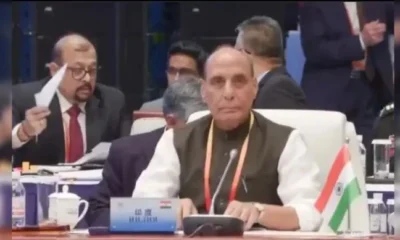Racing towards a warming world, humanity needs to take unprecedented steps to curb carbon emissions within the next ten years if it has to avoid catastrophic climate change, and India would be among the worst sufferers, says the special report of Intergovernmental Panel on Climate Change (IPCC) was released in South Korea today (Monday, October 8).
The report said while it is still possible to keep the temperature rise of earth below 1.5 degree – frompre-industrial level –the pledges taken by world nations to combat global warming in the Paris agreement aren’t enough to achieve this goal. Not just governments but every individual will have to make his or her lifestyle less carbon intensive to reduce carbon emission to “net zero”, to save the earth.
The report says, “Human activities are estimated to have caused approximately 1.0 degree Celsius of global warming above pre-industrial levels, with a likely range of 0.8 degreecelsius to 1.2 degree celsius. Global warming is likely to reach 1.5 degree Celsius between 2030 and 2052 if it continues to increase at the current rate.”
The already recorded rise of 1 degree in global average temperatures has led to substantial impacts. “Impacts on natural and human systems from global warming have already been observed (high confidence). Many land and ocean ecosystems and some of the services they provide have already changed due to global warming (high confidence).”
A rise in global temperatures by another 0.5 degree Celsius would increase, deepen and spread the impacts wider, the scientists concluded. “Several regional changes in climate are assessed to occur with global warming up to 1.5 degree Celsius compared to pre-industrial levels, including warming of extreme temperatures in many regions (high confidence), increases in frequency, intensity, and/or amount of heavy precipitation in several regions (high confidence), and an increase in intensity or frequency of droughts in some regions (medium confidence).”
“To limit warming to 1.5 degrees, CO2 emissions would need to reach ‘net zero’ around 2050 and it should fall at least by 45% by 2030 (from 2010 levels),” notes the special report prepared by 91 authors from 40 countries. It clearly says that at current emission rates, the 1.5 degree temperature rise will be reached between 2030 and 2052.
While rising temperatures are a concern for all nations, developing countries like India that have fewer resources to combat climate change and a large percent of population under poverty line.
Cause for worry to India is also because the erratic weather pattern induced by climate change has led to more drought, excessive rains and sea level rise.
The report not only exhorts nations for enhanced commitments made in the historic Paris agreement signed in 2015 to stop global warming but it also points out that individual lifestyle will be crucial to keep the rising temperature below the threatening level.
“We have talked about the governments but the report is quite clear that everyone has means to act related to daily choices. The report clearly says that behaviour and lifestyle are important elements of the feasibility of limiting global warming to 1.5 degrees. There are also elements related to diet,” said one of the author scientists in a press conference while releasing the report.
While in India millions of people still don’t have the access to electricity, the lifestyle of people living US and European countries is profligate. The per capita consumption of electricity of US is more than thirty times than in India or more than 60 times than Nigeria.
World Bank data released in 2011 tells us that while in US, 786 in every 1000 people own a car, in India and Bangladesh the figure was just 18 and three respectively.
Ironically, United States has not only withdrawn from Paris agreement of 2015 but it also did not endorse the special report of IPCC.The US said that it accepted the report – it stopped short of vetoing it – but it did not endorse the content and the findings in the report. It also reasserted that it was determined to step out of the Paris Agreement on the first given opportunity.
The US also tried to dilute the contents of the report, including a push to drop references to how historically accumulated emissions in the atmosphere, and not just the current flow of emissions, have caused climate change. It also objected to references to the emissions being reduced in keeping with the principle of equity and fairness.
Scientists, however, say that the world is at the crossroads and what is done till 2030 from now to stop and reduce the greenhouse gas the carbon emissions will be crucial.
The IPCC special report points out that half a degree temperature-rise means a lot for earth and world will be a far better living place if we could keep the temperature rise under 1.5 degree and not allow it to reach to a 2 degree scenario. The report says this half a degree difference will expose 10 million fewer people to risk of rising sea as there will be 10 centimetre lower sea level rise (SLR).
The small island nations face the risk of being submerged in sea if temperatures rise above 1.5 degrees.
The report is not country-specific or region specific but its findings clearly suggest that countries like India will be amongst the worst sufferers of global warming.
“This is not a country-specific report. This shows the global scenario. We expect detailed world and region-specific reports by the end of next year,” said AromarRevi, one of the Coordinating Lead Authors (Adaptation & Mitigation) of IPCC report.
The report stresses on the need to start taking carbon dioxide out of atmosphere as it has serious implication on food security, ecosystems and biodiversity. The summary says progress in the renewables – like solar and wind – would need to be mirrored in other sectors.
The rapid reduction of using fossil fuels for energy will be critical as it will set the nations on a low carbon path. The report says that the mix of measures to adapt the climate change and reduce emissions can have benefits for sustainable development goals.
The report says the world will need to develop large-scale “negative emissions” programs to remove significant volumes of carbon dioxide from the atmosphere. While the basic technologies exist, they have not caught on widely, and a number of scientists have strongly questioned whether we can scale up in the brief time period available.
Current promises made by countries as part of the Paris climate agreement would lead to around 3 degrees Celsius (5.4 degrees Fahrenheit) of warming by the end of the century, and the Trump administration recently released an analysis assuming about 4 degrees Celsius (7.2 degrees Fahrenheit) by 2100 if the world takes no action.
“The IPCC report builds on the well-established body of evidence showing that the coal industry has no role in a climate stable world.” said Jan Erik Saugestad, CEO, Storebrand Asset Management of Norway which provides scalable, sustainable solutions and thematic funds.


 India News24 hours ago
India News24 hours ago
 India News19 hours ago
India News19 hours ago
 India News20 hours ago
India News20 hours ago
 India News4 hours ago
India News4 hours ago
 India News4 hours ago
India News4 hours ago
 India News3 hours ago
India News3 hours ago
 Latest world news3 hours ago
Latest world news3 hours ago















